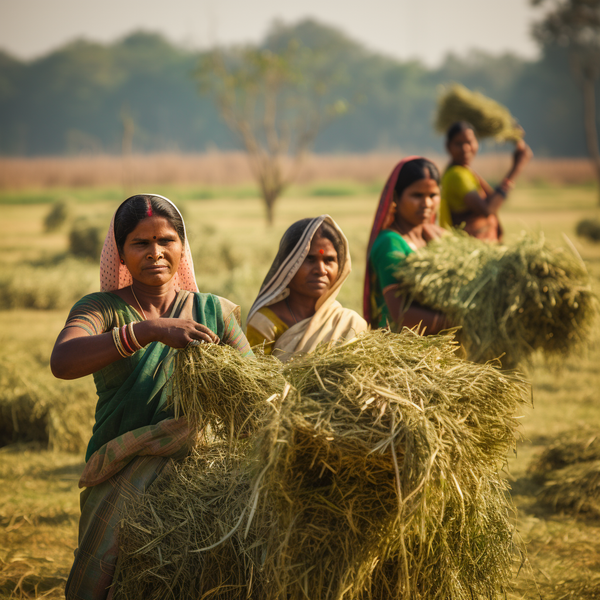
Empowering Communities: The Social Impact of Jute Farming
In a world where sustainable practices and community development are increasingly crucial, jute farming emerges as a shining example of an agricultural endeavor that not only promotes ecological balance but also uplifts rural communities. Jute, often referred to as the "golden fiber," has gained recognition for its versatile applications and environmentally friendly qualities. Beyond its physical attributes, jute farming plays a pivotal role in empowering rural communities, offering them the means to achieve economic growth and self-sufficiency.
Jute Farming: A Sustainable and Community-Focused Practice
Jute, a natural fiber derived from the stalks of the Corchorus plant, has long been a cornerstone of various industries due to its strength, durability, and biodegradability. What sets jute apart is not only its ecological benefits but also its ability to foster community development. Unlike conventional farming practices that may prioritize profit above all else, jute farming integrates sustainability with the welfare of local communities.
Exploring the Positive Impact on Rural Communities
This blog post aims to delve into the profound social impact of jute farming on rural communities. At its core, jute farming represents an avenue for individuals and families in rural areas to secure stable livelihoods. These communities often face economic challenges and limited opportunities. Jute cultivation offers a lifeline by providing a source of employment, thereby addressing unemployment rates and bolstering household incomes.
Jute Farming: A Source of Employment and Income
One of the most significant contributions of jute farming to rural communities is the creation of employment opportunities. From planting and nurturing to harvesting and processing, jute cultivation involves a range of tasks that require skilled labor. This translates to seasonal and year-round jobs for local residents, contributing to reduced dependency on uncertain income sources.
Economic Sustainability and Skill Development
The impact of jute farming extends beyond immediate employment. It offers economic sustainability by generating income for families engaged in cultivation. This newfound financial stability enables families to access essential services such as education and healthcare, which are often out of reach in rural settings. Additionally, jute farming serves as a platform for skill development, empowering community members with knowledge about farming techniques, crop management, and more.
Fostering Community Development and Cohesion
Jute farming acts as a catalyst for community development, promoting social cohesion and collective responsibility. As communities come together to engage in jute cultivation, shared goals and interests emerge. The sense of unity extends beyond the fields and into various aspects of communal life, leading to initiatives for infrastructure improvements, access to clean water, and educational programs.
Section 1: The Role of Jute Farming in Rural Livelihoods
Jute farming, deeply rooted in rural landscapes, holds a significant position in the tapestry of traditional livelihoods. For generations, this practice has not only sustained communities but also offered a way of life that intertwines with historical heritage. The prevalence of jute farming in rural areas speaks to its enduring importance and its profound role in addressing social and economic challenges faced by these communities.
The Historical Context of Jute Farming as a Traditional Livelihood
Jute farming's historical context is steeped in tradition and cultural heritage. It has been a mainstay in rural areas, providing families with a means of sustenance and a way to connect with their ancestral roots. The cultivation of jute, often passed down through generations, serves as a reminder of the profound relationship between people and the land they cultivate.
Addressing Social and Economic Challenges through Jute Farming
Rural communities frequently grapple with a myriad of social and economic challenges. Limited access to education, healthcare, and economic opportunities can create a cycle of stagnation. Here, jute farming steps in as a solution, offering a pathway to overcome these challenges. By engaging in jute cultivation, communities gain access to income, self-sufficiency, and the potential for upward mobility.
Section 2: Jute Farming as a Source of Employment
Jute farming serves as a beacon of hope for local residents seeking employment opportunities in rural regions. Its multifaceted nature creates a spectrum of roles that cater to a diverse workforce, ranging from skilled farmers to dedicated laborers.
Diverse Employment Opportunities Provided by Jute Farming
Jute cultivation opens doors to a range of employment opportunities for local residents. Skilled farmers engage in planting, nurturing, and harvesting jute plants, ensuring the successful growth of the crop. Meanwhile, laborers contribute to various tasks such as bundling, transporting, and processing jute fibers. This diversity of roles ensures that individuals with varying skill sets can find meaningful employment within the jute industry.
Seasonal and Year-Round Jobs: A Pathway to Reduced Unemployment Rates
One of the remarkable aspects of jute farming is its ability to offer both seasonal and year-round employment. The cultivation cycle spans several months, encompassing planting, tending, and harvesting phases. This cycle provides consistent work for laborers throughout the cultivation season. Furthermore, jute's demand in various industries ensures that jobs related to jute cultivation continue beyond the cultivation cycle, contributing to reduced unemployment rates in rural regions.
Section 3: Income Generation and Economic Sustainability
Jute farming, with its roots deeply embedded in rural landscapes, brings forth a wealth of economic opportunities for families engaged in cultivation. This practice serves as a catalyst for increased household income and economic stability, effectively breaking the cycle of financial uncertainty that often plagues rural communities.
Empowering Families Through Increased Household Income
At the heart of jute farming lies the transformation of families' financial realities. Engaging in jute cultivation translates to increased household income, a vital lifeline that supports the needs and aspirations of individuals and their families. As families actively participate in every stage of jute cultivation, from planting to harvesting, the rewards reaped directly impact their economic well-being.
Enhancing Economic Stability through Jute Sales Revenue
The revenue generated from the sale of jute is more than just monetary; it represents economic stability and the promise of a secure future. Jute's multifaceted applications, spanning textiles, crafts, and packaging industries, contribute to a constant demand for this versatile fiber. As a result, families engaged in jute farming can rely on a steady stream of income, reducing the vulnerability often associated with relying solely on unpredictable agricultural cycles.
Access to Essential Services and Quality of Life Improvement
The economic gains derived from jute farming extend beyond immediate financial needs. Families are empowered to access essential services such as healthcare, education, and clean water, which are cornerstones of a better quality of life. The revenue from jute sales not only addresses immediate needs but also acts as a catalyst for long-term improvements, nurturing a brighter future for generations to come.
Section 4: Skill Development and Knowledge Sharing
Jute farming goes beyond being a source of income; it transforms into a conduit for skill development and knowledge sharing within rural communities. This practice serves as a platform for community members to acquire valuable skills that contribute to sustainable and efficient farming practices.
Cultivating Skills in Farming Techniques and Crop Management
Engaging in jute farming equips individuals with a diverse range of skills that go beyond the boundaries of the field. From mastering planting techniques to understanding crop management strategies, community members become adept at a wide array of agricultural practices. These skills not only enhance their abilities as farmers but also enable them to diversify their expertise for future endeavors.
Importance of Knowledge Sharing for Sustainable Practices
Central to the longevity of jute farming practices is the exchange of knowledge within communities. The traditional wisdom of older generations is harmoniously blended with innovative approaches, creating a dynamic ecosystem of farming techniques. This knowledge-sharing culture ensures that the best practices are preserved and passed down, safeguarding the sustainability of jute cultivation against the backdrop of evolving challenges.
Section 5: Strengthening Local Economies
Jute farming goes beyond being a solitary agricultural practice; it's a catalyst for a web of economic activities that breathe life into local economies. The intricate dance between jute farming, farmers, traders, and associated businesses creates a synergistic relationship that fuels economic growth and vitality.
Interconnectedness of Jute Farming with Local Economies
Jute farming operates as a cornerstone of local economies, with each step of the cultivation process contributing to a chain of economic activities. Farmers engaged in jute cultivation directly benefit from the revenue generated by their efforts. However, the impact doesn't stop at the farm gate. Traders and middlemen involved in buying and selling jute fibers amplify the economic ripple, creating a network of economic exchanges that foster growth.
Multiplier Effect on Various Sectors
The impact of jute farming goes beyond its immediate sphere, extending its influence into various sectors that depend on jute as a resource. The transportation industry witnesses an increase in demand as jute fibers are transported from fields to factories. Packaging businesses find value in jute's versatility as a biodegradable packaging material. The trade of jute-based products, whether textiles or handicrafts, stimulates economic activity and boosts local trade. This multiplier effect emphasizes the interconnectedness of different economic sectors, all tied to the cultivation of this remarkable fiber.
Section 6: Women's Empowerment Through Jute Farming
Within the fields of jute cultivation, women play a pivotal role that extends far beyond the crops they tend to. Jute farming emerges as an avenue of empowerment, offering women opportunities to assert their skills, claim their space, and contribute to their families' well-being.
The Crucial Role of Women in Jute Farming
Women have a profound influence on every stage of jute farming, from planting the seeds to processing the fibers. Their engagement underscores their dedication, resilience, and ability to steer the course of their families' destinies. As primary caregivers and household managers, women's involvement in jute farming translates to economic stability and holistic empowerment.
Initiatives Fostering Gender Equality
Initiatives and success stories within the realm of jute farming highlight the transformative power of women's involvement. Women's self-help groups, cooperative societies, and community-led efforts are breathing new life into rural landscapes. These endeavors create avenues for women to access credit, skills training, and leadership roles, ultimately shaping gender dynamics within rural communities.
Economic Status and Gender Equality
Jute farming is an agent of change that transcends traditional gender roles. By participating in various aspects of jute cultivation, women contribute significantly to their families' economic status, bolstering their position in decision-making processes. This empowerment not only improves the lives of women themselves but also paves the way for a more inclusive and equitable society.
Conclusion and Call to Action
As explored in the various sections, the social impact of jute farming extends far beyond agricultural practices. Jute cultivation emerges as a force for positive change, empowering individuals, families, and entire communities. By embracing the social impact of jute farming, we embrace the potential for transformative change in the lives of those who till the earth and sow the seeds of a better future. It's imperative to recognize that jute farming's contribution to community empowerment isn't merely a footnote in history; it's a powerful testament to the ability of sustainable practices to shape lives, strengthen bonds, and build resilient societies.
As we move forward, it's essential to support sustainable practices like jute farming, which enable social empowerment and economic growth in rural regions. Share this article to spread awareness about the social impact of jute farming and consider exploring the eco-friendly products offered by Jute Gardens, where the spirit of community empowerment and sustainability flourishes. Together, we can nurture a more inclusive, empowered, and sustainable future for all.

